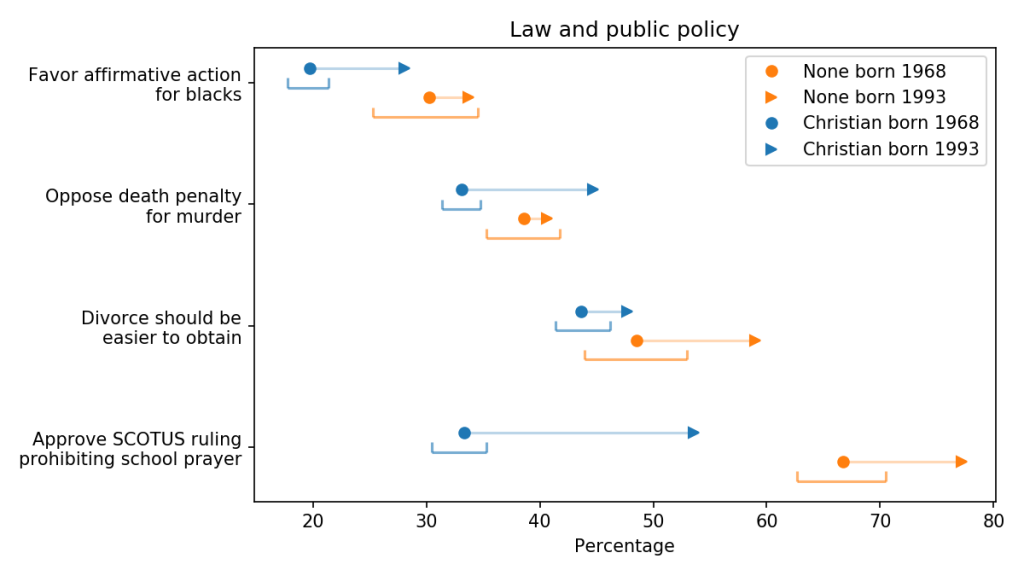Generational changes in religious belief and public policy
This is the second in a series of articles where I use data from the General Social Survey (GSS) to explore
- Differences in beliefs and attitudes between Christians and people with no religious affiliation (“Nones”),
- Generational differences between younger and older Christians, and
- Generational differences between younger and older Nones.
In the first article I looked at changes in religious beliefs; in this article, we’ll see how those beliefs relate to public policy.
I picked nine questions that were included in the GSS during the period from 1998 to 2018, and selected respondents born during or after 1940. For details of the methodology, see the previous article.
Here are results for five propositions with relatively high support:

The blue markers are for people whose religious preference is Catholic, Protestant, or Christian; the orange markers are for people with no religious affiliation.
For each group, the circles show estimated percentages for people born in 1968; the arrowheads show percentages for people born in 1993.
For both groups, the estimates are for 2018, when the younger group was 25 and the older group was 50. The brackets show 90% confidence intervals.
The first row shows the percentage of respondents who answered “Yes” to the question “Do you think the use of marijuana should be made legal or not?”
Young Christians are substantially more likely to support legalization than their parents’ generation. Among the Nones, support might also be increasing, but the change is within the statistical margin of error.
Young Christians also support legal pornography. When asked, “Which of these statements comes closest to your feelings about pornography laws?”, more than 75% of them indicated that it should be legal, or legal for adults, rather than illegal. That’s more than 10 percentage points higher than in the previous generation.
Support for legal pornography has also increase among the unaffiliated, from 85% to almost 90%.
Young Christians are more likely to support legal euthanasia; when asked “When a person has a disease that cannot be cured, do you think Doctors should be allowed by law to end the patient’s life by some painless means if the patient and his family request it?”, more than 75% say “Yes”.
On these three questions, Christians are moving toward the position of their secular peers. On the other two questions, there are no clear patterns:
- Support for gun control might have decreased among Christians, which is consistent with patterns I observed in a previous project.
- Support for fair housing policy is high in both groups and might be increasing.
Here are results for four propositions with somewhat lower support:

These results shows that younger Christians are more likely than the previous generation to:
- Support affirmative action,
- Oppose legal obstactles to divorce,
- Oppose the death penalty, and
- Approve the prohibition of prayer in public schools.
In each case, Christians are moving toward the position held by the nonreligious, and in one case they have overtaken them: Christians are now more likely to oppose the death penalty than Nones of the current or previous generation.
Regarding school prayer, they were asked “The United States Supreme Court has ruled that no state or local government may require the reading of the Lord’s Prayer or Bible verses in public schools. What are your views on this–do you approve or disapprove of the court ruling?” More than 50% of young Christians answered that they approve, 20 percentage points higher than the previous generation.
Summary
These results suggest that people who identify as Christians are more politically progressive than previous generations. On most issues of law and public policy, a 25-year old Christian is more aligned with a 50-year old None than a 50-year old Christian.
In the next article, I’ll explore generational changes in other opinions and attitudes.
Related reading: In this article about an evangelical Christian activist, The Washington Post Magazine asks “Can Shane Claiborne’s progressive version of evangelical Christianity catch on with a new generation?” The article emphasizes Claiborne’s progressive views on reducing gun violence. My analysis of data from the GSS suggests that young Christians are more progressive than previous generations on many issues, but gun control is not one of them.